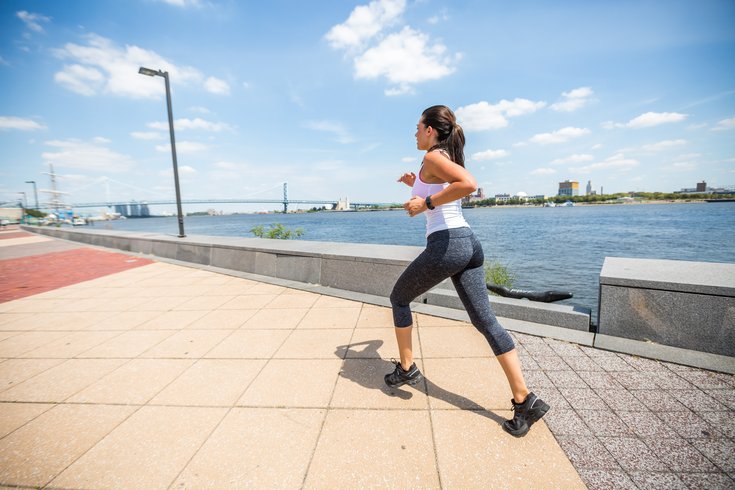
October 05, 2015
 Thom Carroll/PhillyVoice
Thom Carroll/PhillyVoice
PhillyVoice contributor, Christie Mandie runs near the Delaware River at Penn's Landing.
In an era of extreme sports and hyper-fitness, it’s easy to forget that simply exercising for 40 minutes a day can have a huge impact on your overall health. If you want to train for an Everest climb or the Ironman Triathlon, fine. But it really requires only a simple daily exercise routine for your body to realize substantial health benefits.
Whether your 40 minutes daily is a brisk aerobic walk, a lively set of singles tennis, a several-mile run, quietly swimming laps in a health club pool or some time on the treadmill, you can manage to do everything from lower your blood pressure and cholesterol to preventing chronic conditions like heart disease or stroke.
Here are just a few ways that a daily 40-minute exercise regimen can improve your overall health.
Obviously, diet plays a huge role, but the very definition of weight loss is the burning of more calories by movement than you take in as food. Anyone who’s trying to lose weight knows it’s not quite that simple, and there are indeed large variations among people as to how much exercise they need to maintain or lose weight. However, maintaining and/or lowering your weight is a direct function of daily exercise.
Type 2 Diabetes is directly linked to being overweight and obesity. Lowered rates of what is known as metabolic syndrome – high blood sugar and triglycerides, low “good” cholesterol, elevated blood pressure and too much fat around the waistline – have been directly linked to daily exercise.
The loss of bone density as you age is something that can be helped by daily aerobic physical activity that uses your muscular-skeletal system. A lower risk of hip fractures is but one health condition that research has traced to moderate-intensity exercise on a daily basis.
Many doctors' advice to patients about dealing with arthritis is, “Don’t stop moving.” That’s because regular, daily exercise – aerobic but low-impact – can help you manage the discomfort of joint pain.
Seriously. Regular daily exercise can double the number of brain cells your brain normally produces (we produce new brain cells throughout our lives). This increases the size of the hippocampus – the area of the brain linked to both learning and memory.
Anyone who’s walked around the block on a crisp, sunny, fall day knows what research has shown – physical activity makes you feel good. It’s a natural mood-enhancer. Related research shows that daily physical activity lessens your chances of developing depression, insomnia and dementia.
The two leading causes of death in the U.S. are heart disease and stroke. Moderate-intensity physical activity has been linked to a lower risk of both of these conditions. The lowering of blood pressure and cholesterol levels is likely a big part of this relationship.
There are various things that researchers in longevity and living longer have pinpointed as contributing to longevity – the adoption of extremely-low-calorie diets (not recommended), a daily lifestyle based on routine, etc. But few things have as direct and as positive an effect on wellness as moving more. Studies have linked moderate-intensity aerobic activity as a significant contributing factor in lessening the chance of early death.
The list of benefits from moderate daily exercise goes on, and our increasingly sedentary modern lifestyles really have made a 40-minute daily commitment important -- some would say essential. The trick is starting a daily regimen and sticking with it. Obviously, if you have a chronic health condition, you should consult a doctor before launching into an exercise routine. The best thing to do is start slowly – a brisk walk, in all its simplicity and safety, really is the ideal physical activity.